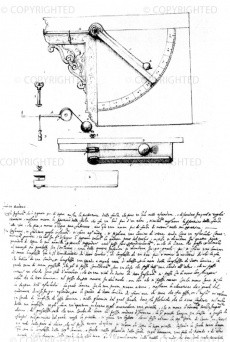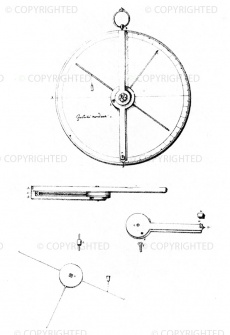Forces Gauge
From Inventions
| (2 intermediate revisions not shown) | |||
| Line 17: | Line 17: | ||
|link= | |link= | ||
| - | |immagini= | + | |immagini= |
| - | |||
| - | Image: | + | <gallery widths=230 heights=368 perrow=3> |
| + | |||
| + | Image: 56705.jpg | Giacomo Contarini. ''Figure d'Istromenti Matematici'', Oxford, c. 1590, c41.<br /> | ||
| + | Image: 56706.jpg | Giacomo Contarini. ''Figure d'Istromenti Matematici'', Oxford, c. 1590, c43.<br /> | ||
| - | |||
| - | |||
</gallery> | </gallery> | ||
| + | |||
|autore_scheda= Filippo Camerota | |autore_scheda= Filippo Camerota | ||
Current revision as of 08:26, 10 September 2010
Contents |
Inventor
Fabrizio Mordente
Historic Period
ca. 1570
Description
Instrument fabricated in two versions described by Giacono Contarini as the invention of Fabrizio Mordente. In the first variant the instrument consists of a quadrant carrying an index bearing a variable weight along its length and an arm bearing a counterweight. The instrument was used to measure the ratio of the force required for a man to climb two different gradients, or to tighten two screws with differently inclined thread. In the second variant the instrument has the form of an astrolabe. It is a sort of "balance" mounted on a graduated disc and connected to an index adjustable in relation to a given inclination. The instrument was used to measure the ratio between weight and counterweight to reach a situation of equilibrium. It was used in designing wheels for mills and pumps for drawing water from wells.
Bibliographical Resources
Contarini,Giacomo, Figure d'Istromenti Matematici e loro uso, ms, ca. 1590, Oxford, Bodleian Library, Ms. Canon. Ital. 145, cc. 41-44.
Images
Author of the entry: Filippo Camerota


